The first time I can recall seeing the word 'mindfulness' was skimming through my mother's copy of Queen Afua's Heal Thyself. The book was a manifesto of mental, physical, and spiritual tools to deepen the Black woman's connection with herself and with God. At the time, there weren't any apps or blogs about wellness. Yoga was still a relatively new concept here in the States, and it would be over a decade before we, as Black people, became more widely accepting of Eastern ideals of healing. However, there clearly was a knowledge of how to center ourselves way before it became a trend.
This got me thinking.
Had I been observing Black women practicing mindfulness without having a term to apply to it? Absolutely. By definition, mindfulness is a mental state achieved by focusing one's awareness on the present moment while calmly acknowledging and accepting one's feelings, thoughts, and bodily sensations. So, I thought of all the times I'd seen Black women in my life sitting on porches or in-room corners, quietly letting their minds be calmed by the silent space they'd created for themselves. Focusing their awareness on their need to take a moment—to regroup, to listen to their hearts, to go within—was them showing me mindfulness in action.
Long before there were places to gather to sit in silence with others, Black women have had to use bathroom stalls, offices, cars, and cubicles to salvage a moment for themselves. We escape the microaggressions thrust upon us in work and academic settings by saying what all the time? "Girl, just breathe," that's right. Using our breath to bring our heart rate down and steady our minds to make the right choices not despite how we feel but with a full acceptance of our feelings and a decision to move beyond them.
We may not have had the vocabulary, but we've always had the intention. How many times have you heard an older Black person predict the weather or forecast a season change based on how their bodies feel? Trusting our bodily sensations and allowing them to inform us is not new to Black people. We've done it for centuries. We are a people deeply in tune with our physical bodies. At the core of our community has always been spirituality and a keen awareness of how we feel. Perhaps the only difference now is that we have more forums to express these things openly.
Mindfulness, much like Black women, is not a monolith. It can be practiced in more ways than just sitting in a meditative state. It can be in how we move our bodies and, let's be honest, no one in the world moves like Black women do. When Black women decide to speak with our physical forms, we do it to express our joy, sensuality, sadness, anger, and everything in between. We step, sashay, twerk, and even pole dance to feel free of anything that has been weighing us down. And when our feet can't move, we turn to microphones and pens to do our bidding. We sing our pain in beautiful melodies and rage against systems atop syncopated rhythms and booming bass. Hip hop, R&B, soul, and gospel music are our yoga studios and meditation retreats too. And they are as important and valid as any mantras or affirmations.
We are a mindful people.
And as we start to infiltrate the wellness community by way of women like Lauren Ash of Black Girl In Om, Lalah Delia, Alexandra Love, Dr. Angela Rose Black of Mindfulness For The People, and many others, may we not forget that it is in our blood to practice self-care. It is how we have survived centuries of atrocities and remain the heartbeat of the world. It is how we have raised families and birthed art that no one other than us could create. Your auntie's backroom, where she lit incense and read her magazines, was as much a personal sanctuary as anywhere else. Your sister's journaling practice is just as powerful and grounding as a trip to the woods to sit amongst nature. And your extra minutes in your car to sing your favorite part of your favorite song is the way you've been staying in tune with yourself for years now.
